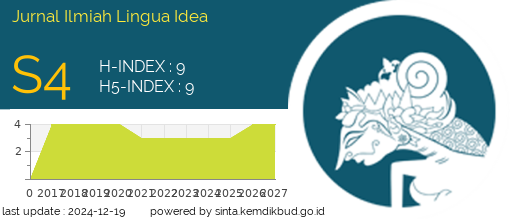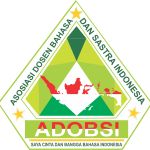Revoicing Attitude of Virginity Test: An Appraisal-based Translation Study on News Discourse
Abstract
The virginity test is a long-standing tradition that has been documented in at least 20 countries around the globe (WHO, 2018). Women and girls are frequently subjected to or forced to undergo this test for various reasons. In the Indonesian context, this gynecological examination conducted under the belief to determine if a woman has had vaginal intercourse has to be experienced by female military candidates. In response, the Indonesian army has set to remove this somewhat controversial policy. Through media, this issue was packed in such a way that reflects the media's stance. Accordingly, this research aims to investigate how media take a stance toward this issue and how the translated version delivers it from the perspective of translation studies and appraisal theory using the qualitative method. Appraisal resources identified the data and compared the original text to the Indonesian versions retrieved from the ABC online news portal (Australian and Indonesia-based). This method is conducted to gather and interpret any attitudinal resources in both original and translated texts. It reveals that the translated version, compared to the more neutral-sounded original one, exploits a more clear-cut attitude towards the issue. Various attitudinal lexis including invasive, gender-based, victim and abusive, are chosen to revoice her stance that this practice is groundless. Through its translation, the author articulates her attitude louder. It proves that different target readers influence how the information is packed and constructed. As a re-situated text, translation barely occurs in an empty space.
References
Cahyono, S. P., Areni, G. K. D., & Sumarlam, S. (2021). Ideology and Power in Political News Text: Appraisal in Critical Discourse Analysis. Language Circle: Journal of Language and Literature, 15(2), 349–360. https://doi.org/10.15294/lc.v15i2.28896.
Chalimah, C., Santosa, R., Djatmika, D., & Wiratno, T. (2018). Evaluating Attitudes in News Text: Appraisal in Critical Discourse Study. Proceedings of the Fourth Prasasti International Seminar on Linguistics (Prasasti 2018). Fourth Prasasti International Seminar on Linguistics (Prasasti 2018), Surakarta, Indonesia. https://doi.org/10.2991/prasasti-18.2018.10.
Crosby, S. S., Oleng, N., Volpellier, M. M., & Mishori, R. (2020). Virginity testing: Recommendations for primary care physicians in Europe and North America. BMJ Global Health.
Flick, U. (2022). The SAGE handbook of qualitative research design.
Jusry, V., & Cahyono, S. P. (2021). Translation Techniques in Translating Attitude Appraisal in a Movie “The Queen’s Gambit: Exchanges”: Appraisal Perspective. English Language Teaching.
Martin, J.R., & Rose, D. (2003). Working with Discourse: Meaning beyond the clause. Continuum.
Martin, J. R., & White, P. R. R. (2005). The language of evaluation: Appraisal in English. Palgrave Macmillan.
Mayo & Taboada. (2017). Evaluation in political discourse addressed to women: Appraisal analysis of Cosmopolitan’s online coverage of the 2014 US midterm elections. Discourse, Context & Media, 18, 40–48. https://summit.sfu.ca/_flysystem/fedora/sfu_migrate/18908/Aloy-Mayo_Taboada_DCM_2017.pdf.
Liu, Q.Y., Ang, L.H., Waheed, M., & Kasim, Z. M. (2022). Appraisal theory in translation studies: A systematic literature review. Pertanika Journal of Social Sciences and Humanities, 30(4), 1589–1605. https://doi.org/10.47836//pjssh.30.4.07.
Olson, R. (2018). World Health Organization: Eliminating virginity testing: An interagency statement. Researchgate. https://www.researchgate.net/publication/342002143_World_Health_Organization_Eliminating_Virginity_Testing_An_Interagency_Statement.
Olson, R. M., & García-Moreno, C. (2017). Virginity testing: A systematic review.
Risdianto, F., Sumarlam, S., Djatmika, D., & Wiratno, T. (2024). Appraisal and Ideology Realization in Indonesia State Capital Relocation News Texts. International Journal of Society Culture and Language, Online First. https://doi.org/10.22034/ijscl.2024.2022445.3381
Spradley, J. P. (2011). Participant observation (Nachdr.). Wadsworth, Cengage Learning.
Tampubolon, M. (n.d.). Virginity Test in Police Recruitment System: Evidence from Indonesia.
Tampubolon, M. (2021). Virginity Test in Police Recruitment System: Evidence from Indonesia. Budapest International Research and Critics Institute (BIRCI-Journal): Humanities and Social Sciences, 4(2), 2600–2611. https://doi.org/10.33258/birci.v4i2.1965
Qian, H. (2012). Investigating translators’ positioning via the appraisal theory: A case study of the Q&A part of a speech delivered by the U.S. vice president Cheney. Sino-US English Teaching, 9(12), 1775–1787.
Qian, H. (2017). Investigating ‘unfaithful’ translations via the appraisal theory: A case study of translations of public notices. AWEJ for Translation and Literary Studies, 1(1), 187–200. https://doi.org/http://dx.doi.org/10.24093/awejtls/vol1no1.13.
Wibawa, T. (2021). Indonesian army set to remove gender-based health checks, end so-called ‘virginity testing.’ ABC News. https://www.abc.net.au/news/2021-08-05/indonesia-tni-army-armed-forces-end-virginity-testing/100349900.
World Health Organization. (2018). Eliminating Virginity Testing: An Interagency Statement. 24 June 2024. https://www.who.int/publications/i/item/WHO-RHR-18.15
Zain, Abd. R., & Nababan, M. R. (2023). An Appraisal Theory Approach to Translate an Emotional Dimension in The Tell-Tale Heart. International Journal of Multicultural and Multireligious Understanding, 10(6), 15. https://doi.org/10.18415/ijmmu.v10i6.4622.
Zayed, A. A., Elbendary, R. N., & Moawad, A. M. (2022). Questioned Virginity Has No Definite Reply. Archives of Sexual Behavior.

This work is licensed under a Creative Commons Attribution-ShareAlike 4.0 International License.
Authors who publish with Jurnal Ilmiah Lingua Idea agree to the following terms:
- Authors retain copyright and grant the journal right of first publication with the work simultaneously licensed under a Creative Commons Attribution License (CC BY-SA 4.0) that allows others to share the work with an acknowledgment of the work's authorship and initial publication in this journal.
- Authors are able to enter into separate, additional contractual arrangements for the non-exclusive distribution of the journal's published version of the work (e.g., post it to an institutional repository or publish it in a book), with an acknowledgment of its initial publication in this journal.
- Authors are permitted and encouraged to post their work online (e.g., in institutional repositories or on their website) prior to and during the submission process, as it can lead to productive exchanges, as well as earlier and greater citation of published work.





















.png)




_.png)


